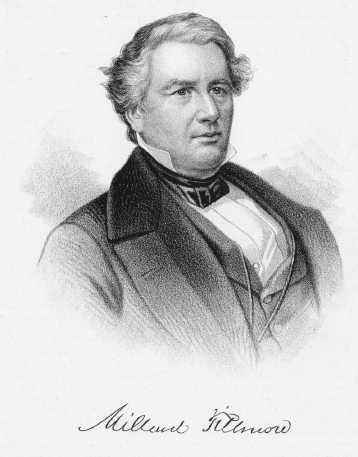68 MILLARD
FILLMORE.
MILLARD
FILLMORE.
well prepared to prosecute his legal studies as was
Millard Fillmore when he graduated at the
clothing-mill at the end of four years of manual
labor, during which every leisure moment had been
devoted to intense mental culture.
In 1823, when twenty-three years of
age, he was admitted to the Court of Common Pleas. He
then went to the village of Aurora, and commenced the
practice of law. In this secluded, peaceful region,
his practice of course was limited, and there was no
opportunity for a sudden rise in fortune or in fame.
Here, in the year 1826, he married a lady of great
moral worth, and one capable of adorning any station
she might be called to fill,--Miss Abigail Powers.
His elevation of character, his
untiring industry, his legal acquirements, and his
skill as an advocate, gradually attracted attention;
and he was invited to enter into partnership under
highly advantageous circumstances, with an elder
member of the bar in Buffalo. Just before removing to
Buffalo, in 1829, he took his seat in the House of
Assembly, of the State of New York, as a
representative from Erie County. Though he had never
taken a very active part in politics, his vote and his
sympathies were with the Whig party. The State was
then Democratic, and he found himself in a helpless
minority in the Legislature, still the testimony comes
from all parties, that his courtesy, ability and
integrity, won, to a very unusual degree the respect
of his associates.
In the autumn of 1832, he was
elected to a seat in the United States Congress He
entered that troubled arena in some of the most
tumultuous hours of our national history. The great
conflict respecting the national bank and the removal
of the deposits, was then raging.
His term of two years closed; and he
returned to his profession, which he pursued with
increasing reputation and success. After a lapse of
two years he again became a candidate for Congress;
was reelected, and took his seat in 1837. His past
experience as a representative gave him strength and
confidence. The first term of service in Congress to
any man can be but little more than an introduction.
He was now prepared for active duty. All his energies
were brought to bear upon the public good. Every
measure received his impress.
Mr. Fillmore was now a man of wide
repute, and his popularity filled the State, and in
the year 1847, he was elected Comptroller of the
State.
Mr. Fillmore had attained the age of
forty-seven years. His labors at the bar, in the
Legislature, in Congress and as Comptroller, had given
him very considerable fame. The Whigs were casting
about to find suitable candidates for President and
Vice-President at the approaching election. Far away,
on the waters of the Rio Grande, there was a rough old
soldier, who had fought one or two successful battles
with the Mexicans, which had caused his name to be
proclaimed in trumpet-tones all over the land. But it
was necessary to associate with him on the same ticket
some man of reputation as a statesman.
Under the influence of these
considerations, the names of Zachary Taylor and
Millard Fillmore became the rallying-cry of the Whigs,
as their candidates for President and Vice-Peesident
(sic). The Whig ticket was signally triumphant. On the
4th of March, 1849, Gen. Taylor was inaugurated
President, and Millard Fillmore Vice-President, of the
United States.
On the 9th of July, 1850, President
Taylor, but about one year and four months after his
inauguration, was suddenly taken sick and died. By the
Constitution, Vice-President Fillmore thus became
President. He appointed a very able cabinet, of which
the illustrious Daniel Webster was Secretary of
State.
Mr. Fillmore had very serious
difficulties to contend with, since the opposition had
a majority in both Houses. He did everything in his
power to conciliate the South; but the pro-slavery
party in the South felt the inadequacy of all measures
of transient conciliation. The population of the free
States was so rapidly increasing over that of the
slave States that it was inevitable that the power of
the Government should soon pass into the hands of the
free States. The famous compromise measures were
adopted under Mr. Fillmore's administration, and the
Japan Expedition was sent out. On the 4th of March,
1853, Mr. Fillmore, having served one term,
retired.
In 1856, Mr. Fillmore was nominated
for the Presidency by the "Know Nothing" party, but
was beaten by Mr. Buchanan. After that Mr. Fillmore
lived in retirement. During the terrible conflict of
civil war, he was mostly silent. It was generally
supposed that his sympathies were rather with those
who were endeavoring to overthrow our institutions.
President Fillmore kept aloof from the conflict,
without any cordial words of cheer to the one party or
the other. He was thus forgotten by both. He lived to
a ripe old age, and died in Buffalo. N. Y., March 8,
1874.

